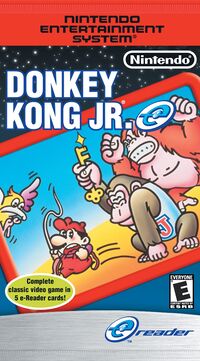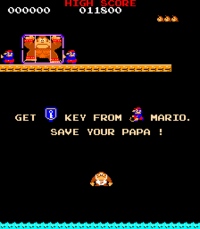Donkey Kong Jr. (game)
It has been requested that this article be rewritten and expanded to include more information. Reason: include a Critical Reception section
Donkey Kong Jr., also spelled Donkey Kong Junior in early arcade releases and home ports, is an arcade game starring Donkey Kong Jr. It is the direct sequel to Donkey Kong, and it and the similar Donkey Kong II are the only games in the Mario franchise where Mario (previously known as Jumpman) is the antagonist.
Donkey Kong Jr. never enjoyed the sales or the following that the original Donkey Kong did, but it did well enough to warrant a second sequel, Donkey Kong 3.
Story
After the events of Donkey Kong, Mario has captured Donkey Kong as revenge for kidnapping his lady friend and Donkey Kong Jr. has to save him. Donkey Kong Jr. will travel through four stages from the jungle to the big city to get his father back, climbing vines, avoiding enemies and jumping on platforms along the way. However, every time Donkey Kong Jr. gets close to freeing his father, Mario just pushes him further away.
Finally in his hideout, Mario appears to be atop a skyscraper similar to 100m from the last game. Donkey Kong Jr. has to put six keys into their keyholes to free his dad and make the platform they're standing on disappear. Donkey Kong and Mario both fall down and Donkey Kong Jr. catches Donkey Kong but Mario just hits the ground. Donkey Kong Jr. carries his dad off-screen as Mario gets up and runs after them, only to be kicked right back out by Donkey Kong, forcing him to flee. In the NES port, this is altered to Mario falling to his apparent death for unknown reasons.
Gameplay
As a direct sequel, Donkey Kong Jr. retains many elements from Donkey Kong, although the two games are significantly different. While the original installment took place in a construction setting, Donkey Kong Jr. takes place in a jungle-like setting, from which Donkey Kong Jr. can climb up vines, drop fruit, or jump from place to place.
In order to free his father, Donkey Kong Junior must collect the key being kept at the end of each level, eventually using those keys to free his father in the end. All the while, however, Mario will sit near the Key as well as Donkey Kong's cage, summoning waves of monsters after Donkey Kong Junior from his position. After Donkey Kong gains a key, Mario will take Donkey Kong to the next location.
Levels
Characters
| Character | Name | Debut | Information |
|---|---|---|---|
| File:DKJR sprite.png | Donkey Kong Jr. | Stage 1 | The son of Donkey Kong, Donkey Kong Junior is the titular protagonist of Donkey Kong Jr., who has the ability to climb up vines. |
| Donkey Kong | Stage 1 | Donkey Kong Jr.'s father, held by Mario at the end of every level. | |
| Mario | Stage 1 | The main antagonist, Mario appears in every level at the end of each stage, throwing obstacles at Donkey Kong Jr. or guarding Donkey Kong. |
Enemies
| Enemy | Name | Debut | Information |
|---|---|---|---|
| File:Blue Snapjaw.png |
Snapjaw | Stage 1 | Crocodile-like enemies that move after Donkey Kong Junior. Red ones will stay in one particular area, while the blue ones, which are summoned by Mario, will move aimlessly until they reach a vine, where they will continuously move down until they fall off. |
| File:DKJrNitpicker.png File:DKJrCrow.png |
Nitpicker | Stage 2 | Birds that fly down in an attempt to ram into Donkey Kong Junior. Some may also drop eggs at random intervals. Although generally resembling canaries, crow-like Nitpickers later appear in the final stage. |
File:DKJrSpark2.png |
Spark | Stage 3 | Electrical balls of energy that travel around a set platform. Red ones, summoned by Mario, will constantly move downwards. |
Items
| Item | Name | Effect |
|---|---|---|
| File:BananaDKJr.png |
Fruit | Fruit can be dropped onto enemies directly bellow Donkey Kong Jr., otherwise gaining a point bonus if no enemy is hit. |
| File:BlueKey.png | Key | Keys are guarded by Mario at the end of each stage. It is mandatory for Donkey Kong Junior to grab these items in order to free his father. |
Re-releases
Donkey Kong Jr. was re-released in several other forms for different game systems.
- Donkey Kong Jr. was released on the Nintendo Entertainment System as part of the Arcade Classics Series, along with Donkey Kong Classics,Donkey Kong Jr. + Jr. Math Lesson, and Donkey Kong/Donkey Kong Jr./Mario Bros. The NES version of the game is also available as a Virtual Console title for the Wii, Nintendo 3DS, and Wii U, with the Nintendo 3DS version also being a part of the 3DS Ambassador Program. The NES version is also a part of the group of games in the NES Classic Edition system.
- Donkey Kong Jr. was remade into a Game & Watch game under the same name, which was later a part of the Mini Classics series, and later receiving a port onto the Nintendo DSi.
- Donkey Kong Jr. is also a part of the minigame collection in Game & Watch Galleries 3 and 4, with both a regular and modern version. It was also released as a five card set for the Game Boy Advance's e-Reader peripheral as Donkey Kong Jr.-e.
References in later games
- Donkey Kong and Mario vs. Donkey Kong: Donkey Kong Jr., as well as many enemies and gameplay elements, make an appearance in this game (with Donkey Kong Jr. only being in the former). Also, Mario's method of trapping Junior in Donkey Kong '94 is identical to Donkey Kong Jr.'s method of freeing his father from captivity. Many enemies and gameplay elements from Donkey Kong Jr. are reused in Mario vs Donkey Kong as well.
- Donkey Kong Country series: Diddy Kong and Dixie Kong's ability to climb two ropes at a time originates from Donkey Kong Jr. The music for this game is redone and replayed in the Golden Temple level of Donkey Kong Country Returns and Donkey Kong Country Returns 3D. A different cover of the song plays in the Secret Seclusion world in Donkey Kong Country: Tropical Freeze. The plotline for Donkey Kong Country 2: Diddy's Kong Quest was also very similar to Donkey Kong Jr., including Donkey Kong being captured by an old enemy (in his case, Kaptain K. Rool) and requiring that Diddy save him by traveling to the place Donkey Kong was being held captive.
- Castlevania: Order of Ecclesia: The lightning trap room where the Vol Fulgur glyph is found is similar to Stage 3 of Donkey Kong Jr. and was most likely based on that stage.
Staff
- Main article: List of Donkey Kong Jr. staff
Produced by
Original Music by
- Yukio Kaneoka
Programming by
- H. Hoshino
- Shigeru Miyamoto
- Yoshio Sakamoto (Logo graphic)
- Kenji Nishizawa
Pre-release and unused content
- Main article: List of Donkey Kong Jr. pre-release and unused content
The arcade version includes an unused lightbulb object as well as several graphical leftovers from the original Donkey Kong. In addition, the Coleco Adam port is notable for originally featuring an unlockable stage, but it was cut at Nintendo's request.
Gallery
- For this subject's image gallery, see Gallery:Donkey Kong Jr. (game).
- DKjr.png
- Stage1.png
Stage 1
- Stage2.png
Stage 2
Donkey Kong's sprite
Media
Reception
Sales
According to The Ultimate History of Video Games: from Pong to Pokemon and beyond...the story behind the craze that touched our lives and changed the world[page number needed], the arcade version of Donkey Kong Jr. sold 30,000 units in North America, half of its predecessor.
e-Reader
In 2002, Donkey Kong Jr. (titled Donkey Kong Jr.-e) was released for the e-Reader as part of Series One.
Cards
Card 1 of 5/codes 1-2
English flavor text: Mario has gone ape and locked your father, Donkey Kong, in a cage. Steal the keys from Mario to set your papa free!
+ Control Pad Moves character
L Button + R Button Resets game to Title Screen
START Start/Pause
SELECT Selects game mode
- Game A is beginner game
- Game B is expert mode
A Button Jumps
B Button Not used
Card 2 of 5/codes 3-4
HOW TO PLAY In Rounds 1 through 3, work your way to the top of the level to reach the key. In Round 4, carry all six keys to the top of the level and put them into their keyholes to free Donkey Kong. Once Donkey Kong is free, the game starts again, but faster and more exciting. Test your skill by saving your father against greater odds.
BEWARE! Each time you collide with a spark, fall from a vine, get bitten by a Snapjaw, or get pecked by a Nitpicker, you'll lose a life. Once all of your lives are gone, the game is over.
Card 3 of 5/codes 5-6
TECHNIQUES Use these two special moves to help speed up the action:
- Grab onto two vines at a time to speed to the top.
- Go down quicker by sliding down just one vine.
Card 4 of 5/codes 7-8
TIPS Timing is everything! In Round 2, press the A Button at just the right time and you'll launch off the springboard onto the moving island.
Drop fruit from vines on your enemies to get extra points.
Score 20,000 points and earn an extra life!
Card 5 of 5/code 9-10
ITEMS Keys: Pick up the keys to Donkey Kong's cage (Rounds 1-3). Insert keys into keyholes to free Donkey Kong (Round 4).
Fruit: Pick up fruit for extra bonus points.
Name in other languages
| Language | Name | Meaning | Notes |
|---|
Trivia
- During the intro of the arcade version of Donkey Kong Jr., there were actually two Marios seen carrying Donkey Kong's cage away.
- Most versions of Donkey Kong Jr., including the NES port, had the ending theme played once instead of twice. The three versions to break this rule were the Intellivision, Coleco Adam, and Atari 8-bit computer ports.
- In the arcade version of the game, between the second and third stages, Mario carries Donkey Kong away in a yellow helicopter, with Jr. following close behind with an umbrella.
References
| Donkey Kong Jr. | ||
|---|---|---|
| Characters | Donkey Kong Jr. • Donkey Kong • Mario | |
| Enemies | Bird • Drop* • Egg • Nitpicker • Snapjaw • Spark | |
| Items | Fruit • Key | |
| Objects | Chain • Jump Board • Pole • Vine | |
| Rounds | Vine Scene • Jump Board Scene • Mario's Hideout • Chain Scene | |
| Other | Gallery • Media • Pre-release and unused content • Staff | |




